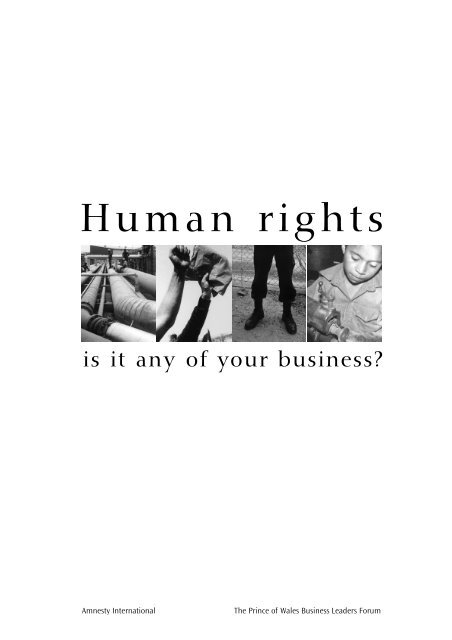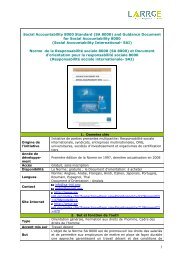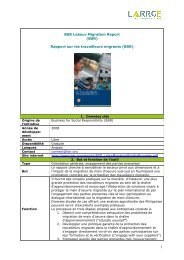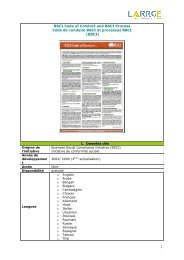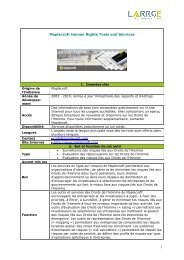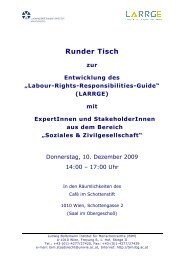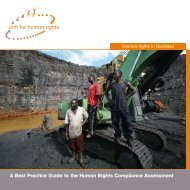Human Rights: Is It Any of Your Business? - Amnesty International
Human Rights: Is It Any of Your Business? - Amnesty International
Human Rights: Is It Any of Your Business? - Amnesty International
You also want an ePaper? Increase the reach of your titles
YUMPU automatically turns print PDFs into web optimized ePapers that Google loves.
<strong>Human</strong> rights<br />
is it any <strong>of</strong> your business<br />
<strong>Amnesty</strong> <strong>International</strong><br />
The Prince <strong>of</strong> Wales <strong>Business</strong> Leaders Forum
<strong>Human</strong> rights – is it any <strong>of</strong> your business<br />
Authors: Peter Frankental and Frances House<br />
Case study researchers: Aidan Davy and Raj Thamotheram<br />
Designer: Alison Beanland<br />
Printed by Folium<br />
Photographs from Panos Pictures<br />
© <strong>Amnesty</strong> <strong>International</strong> UK and The Prince <strong>of</strong> Wales <strong>Business</strong> Leaders Forum<br />
April 2000<br />
<strong>Amnesty</strong> <strong>International</strong> UK<br />
The Prince <strong>of</strong> Wales <strong>Business</strong> Leaders Forum<br />
99-119 Rosebery Avenue 15-16 Cornwall Terrace<br />
London EC1R 4RE<br />
London NW1 4QP<br />
United Kingdom<br />
United Kingdom<br />
Tel: 44 (0)20 7814 6200 Tel: 44 (0)20 7467 3600<br />
Fax: 44 (0)20 7833 1510 Fax: 44 (0)20 7467 3610<br />
www.amnesty.org.uk/business<br />
www.pwblf.org<br />
<strong>Amnesty</strong> <strong>International</strong>’s mandate is to promote<br />
the values <strong>of</strong> the Universal Declaration <strong>of</strong><br />
<strong>Human</strong> <strong>Rights</strong> and to work worldwide for the<br />
release <strong>of</strong> prisoners <strong>of</strong> conscience, for fair trials<br />
for political prisoners and for an end to torture,<br />
extrajudicial executions, ‘disappearances’ and<br />
the death penalty. <strong>Amnesty</strong> <strong>International</strong> is<br />
independent <strong>of</strong> any government, political<br />
persuasion or religious creed.<br />
The Prince <strong>of</strong> Wales <strong>Business</strong> Leaders Forum is an<br />
international charity which was founded in 1990 to<br />
promote socially responsible business practices that<br />
benefit business and society, and which help to<br />
achieve socially, economically and environmentally<br />
sustainable development. The Forum works with<br />
over 50 <strong>of</strong> the world’s leading multinational<br />
companies, and is active in some 30 emerging<br />
and transition economies.<br />
Product code: PB179<br />
ISBN: 1-873328-43-5<br />
This publication is intended to provide terms <strong>of</strong> reference to companies seeking to address the human rights context <strong>of</strong> their<br />
operations. The case studies are presented from the perspective <strong>of</strong> the companies featured and are based primarily on<br />
information provided by them. The recommendations reflect an evolutionary process rather than a definitive statement <strong>of</strong> policy.<br />
Nothing in this document is intended to serve as a judgement on or as an endorsement <strong>of</strong> the human rights record <strong>of</strong> any <strong>of</strong> the<br />
companies pr<strong>of</strong>iled.
Contents<br />
Foreword 5<br />
Executive summary 7<br />
Summary <strong>of</strong> recommendations 11<br />
PART I<br />
1. Overview 21<br />
1.1 <strong>Human</strong> rights – an integral part <strong>of</strong> corporate responsibility 22<br />
1.2 The business case 24<br />
1.3 Integrating human rights into company operations 27<br />
2. Risks and dilemmas 37<br />
2.1 Revenue allocation and corruption 38<br />
2.2 Conflict zones 39<br />
Recommendations 40<br />
The case <strong>of</strong> Angola 41<br />
2.3 Security forces 45<br />
Recommendations 46<br />
The case <strong>of</strong> Shell in Nigeria 47<br />
2.4 Land rights/indigenous peoples’ rights 48<br />
Principles 49<br />
Recommendations 50<br />
The case <strong>of</strong> WMC Resources in the Philippines 51<br />
2.5 Labour rights 52<br />
Principles 52<br />
• Freedom <strong>of</strong> association: the case <strong>of</strong> Reebok 53<br />
• Child labour: the case <strong>of</strong> Pentland Group 56<br />
• Working conditions: the case <strong>of</strong> B&Q 58<br />
• Bonded and forced labour 60<br />
3. Principles to practice 63<br />
Key elements in putting human rights principles into practice 64<br />
BP Amoco – Exerting positive influence 65<br />
Rio Tinto – Facing the challenge <strong>of</strong> implementation 65<br />
Levi Strauss – Forming multi-stakeholder partnerships 66<br />
HUMAN RIGHTS – is it any <strong>of</strong> your business<br />
3
4. Drivers <strong>of</strong> change 67<br />
4.1 Shareholder pressure 68<br />
Shareholder resolutions and AGMs 68<br />
Ethical and socially responsible investment 69<br />
4.2 Transparency and disclosure 72<br />
The power <strong>of</strong> the Internet 73<br />
Consumer pressure 74<br />
4.3 Social reporting and social auditing 75<br />
<strong>International</strong> standards (SA8000, AA1000) 77<br />
4.4 Regulatory pressure 79<br />
<strong>International</strong> Labour Organisation (ILO) conventions 79<br />
Extension <strong>of</strong> legal jurisdiction over companies 79<br />
European Parliament resolution 80<br />
Selective purchasing laws in US 81<br />
London Stock Exchange requirements 82<br />
4.5 Normative pressure 82<br />
Codes <strong>of</strong> conduct 82<br />
Sector-wide and cross-sector initiatives 86<br />
Global Sullivan Principles 88<br />
OECD guidelines 89<br />
UN Global Compact 89<br />
PART II<br />
Company case studies<br />
Risks and dilemmas 94<br />
Security forces Shell in Nigeria 94<br />
Land rights/indigenous peoples’ rights WMC Resources in the Philippines 98<br />
Freedom <strong>of</strong> association Reebok in Indonesia 102<br />
Child labour Pentland Group in Pakistan 105<br />
Working conditions B&Q in India 109<br />
Principles to practice BP Amoco 112<br />
Rio Tinto 115<br />
Levi Strauss 118<br />
PART III<br />
Resources<br />
Guidelines for good corporate practice in human rights<br />
• Confederation <strong>of</strong> Norwegian <strong>Business</strong> and Industry checklist 124<br />
• <strong>Amnesty</strong> <strong>International</strong> <strong>Human</strong> <strong>Rights</strong> Principles for Companies 127<br />
• Universal Declaration <strong>of</strong> <strong>Human</strong> <strong>Rights</strong> 130<br />
Resource list<br />
• Organisations and websites 132<br />
• Publications 138<br />
Index 140<br />
4 HUMAN RIGHTS – is it any <strong>of</strong> your business
Foreword<br />
“One <strong>of</strong> the greatest ironies <strong>of</strong><br />
this period in history is that,<br />
just as technology remakes our<br />
world, the need to maintain<br />
the human dimension <strong>of</strong> our<br />
work, and a company’s sense <strong>of</strong><br />
its social responsibility, is<br />
growing at an equally rapid<br />
pace. Harmonising economic<br />
growth with the protection <strong>of</strong><br />
human rights is one <strong>of</strong> the<br />
greatest challenges we face<br />
today.”<br />
Mary Robinson<br />
UN High Commissioner for<br />
<strong>Human</strong> <strong>Rights</strong><br />
Davos, February 2000<br />
“Big companies need to step<br />
into the breach to ensure that<br />
globalisation delivers more<br />
than a litany <strong>of</strong> dashed hopes.<br />
We must now act as coguarantors<br />
<strong>of</strong> human rights.”<br />
Göran Lindahl<br />
President and CEO <strong>of</strong> ABB<br />
Why do human rights matter to business The globalisation <strong>of</strong> the world<br />
economy in the post-Communist era <strong>of</strong>fers unprecedented opportunities<br />
to business. Consumer goods industries source from an ever-increasing<br />
number <strong>of</strong> suppliers in developing countries and transitional economies.<br />
The extractive industries now have investment options which were previously denied<br />
them by political or ideological barriers.<br />
But with rapidly escalating opportunity come unprecedented levels <strong>of</strong> threat, as<br />
companies find themselves caught up in situations <strong>of</strong> conflict and human rights<br />
violations which are the context for their operations in many countries today. These<br />
constitute a threat to the stability <strong>of</strong> the investment climate, to the physical security <strong>of</strong><br />
employees and installations, and to corporate reputation if companies lack appropriate<br />
policies and practices which today’s informed and critical society expects <strong>of</strong> them. The<br />
pressures on transnational companies to avoid doing harm and to exercise their<br />
legitimate influence for good are growing.<br />
Responsible companies have long understood a duty <strong>of</strong> care towards their employees.<br />
More recently, they have accepted that the bounds <strong>of</strong> their responsibility should be<br />
extended to embrace protection <strong>of</strong> the environment. Today, civil conflict and human<br />
rights violations present them with new challenges and dilemmas for which few have<br />
shown themselves prepared, but which, ignored or badly handled, have proved hugely<br />
damaging to reputation.<br />
The purpose <strong>of</strong> this publication is to inform companies on the human rights problems<br />
they may confront and to assist them in developing policies which will help both to<br />
protect themselves and improve the context in which they work. For the first time in<br />
modern history, a framework <strong>of</strong> international values exists which can help shape<br />
company policy. So too can the example <strong>of</strong> a growing number <strong>of</strong> leading transnational<br />
companies on whose experience we have drawn.<br />
Companies cannot and should not be the moral arbiters <strong>of</strong> the world. They cannot<br />
usurp the role <strong>of</strong> government, nor solve all the social problems they confront. But<br />
their influence upon the global political economy is growing and their presence<br />
increasingly affects the societies in which they operate. With this reality comes the<br />
need to recognise that their ability to continue to provide goods and services and<br />
create financial wealth – in which the private sector has proved uniquely successful –<br />
will depend on their acceptability to an international society which increasingly<br />
regards protection <strong>of</strong> human rights as a condition <strong>of</strong> the corporate licence to operate.<br />
Sir Ge<strong>of</strong>frey Chandler<br />
Chair, <strong>Amnesty</strong> <strong>International</strong> UK <strong>Business</strong> Group<br />
and former Shell senior executive<br />
April 2000<br />
HUMAN RIGHTS – is it any <strong>of</strong> your business<br />
5
6 HUMAN RIGHTS – is it any <strong>of</strong> your business
Executive summary<br />
HUMAN RIGHTS – is it any <strong>of</strong> your business<br />
7
The question <strong>of</strong> human rights is age-old, as is the practice <strong>of</strong> business. And yet<br />
the two issues are only just beginning to be seen as inextricably linked.<br />
Transnational companies which are making genuine attempts to operate<br />
responsibly in this field are, to a large extent, entering uncharted territory<br />
where codes <strong>of</strong> conduct proliferate and interpretations vary. This publication does not<br />
claim to be a definitive guide to this field, but it does <strong>of</strong>fer a comprehensive and<br />
practical introduction to a subject now on the agenda <strong>of</strong> responsible companies and at<br />
the forefront <strong>of</strong> public attention. <strong>It</strong> is targeted primarily at those who formulate policy<br />
and at operational managers <strong>of</strong> transnational companies, tackling the question <strong>of</strong><br />
human rights from Board level through to working with sub-contractors. <strong>It</strong> addresses<br />
the human rights issues and dilemmas that affect companies across most <strong>of</strong> their<br />
functions and throughout their organisational structure. <strong>It</strong> takes as its point <strong>of</strong><br />
departure the Universal Declaration <strong>of</strong> <strong>Human</strong> <strong>Rights</strong> which calls upon ‘every<br />
individual and organ <strong>of</strong> society’ to uphold these internationally accepted standards.<br />
What does this primer <strong>of</strong>fer<br />
• a rationale and a guide for companies to develop and implement human rights<br />
policies<br />
• practical recommendations for good corporate practice, drawing on case studies<br />
from selected transnational companies<br />
• a survey <strong>of</strong> the current landscape facing transnationals where a wide range <strong>of</strong><br />
influences are having an impact on the company’s reputation with regard to its<br />
human rights performance<br />
• an overview <strong>of</strong> useful initiatives, codes and guidelines which may help a company<br />
wanting to put into practice a commitment to uphold human rights standards<br />
PART I<br />
1. Overview:<br />
<strong>Human</strong> rights are now seen as an integral part <strong>of</strong> responsible business. The<br />
internationally accepted framework for human rights is the UN’s Universal<br />
Declaration <strong>of</strong> <strong>Human</strong> <strong>Rights</strong>. This framework should form the basis <strong>of</strong> a company’s<br />
human rights policy and strategy for implementation in all its legitimate spheres <strong>of</strong><br />
influence. Companies operating in countries where serious human rights violations<br />
occur are under heightened scrutiny from local communities, non-governmental<br />
organisations (NGOs), consumer groups and the media. These companies will find<br />
that a human rights policy, underpinned by full support from the Board and<br />
appropriate organisational positioning, is an essential element <strong>of</strong> sound risk<br />
management and reputation assurance. <strong>Human</strong> rights are becoming a bottom-line<br />
business issue. A corporate commitment to upholding international standards can<br />
bring benefits to companies and society at large.<br />
2. Risks and dilemmas:<br />
Transnational companies face innumerable dilemmas in many countries where they<br />
have a presence: investing in areas <strong>of</strong> conflict which pose security threats to property<br />
and personnel; taking investment decisions under an incumbent democratic<br />
government which is later overthrown by a dictatorship; operating in countries where<br />
freedom <strong>of</strong> information and expression are denied to citizens; paying taxes to corrupt<br />
and undemocratic administrations which may allocate more state revenue to the<br />
military than to basic health and education services. These situations carry with them<br />
serious human rights risks for companies. The primer recommends a series <strong>of</strong> steps<br />
companies can take to minimise the negative impact <strong>of</strong> their presence in such<br />
situations and to maximise the positive impact. <strong>It</strong> draws lessons from the experiences<br />
8 HUMAN RIGHTS – is it any <strong>of</strong> your business
<strong>of</strong> a number <strong>of</strong> transnational companies. (See Part II for case studies.)<br />
• Revenue allocation and corruption<br />
• Operating in conflict zones<br />
• Use <strong>of</strong> security forces<br />
• Land rights/indigenous peoples’ rights<br />
• Labour rights: – freedom <strong>of</strong> association<br />
– child labour<br />
– working conditions<br />
– bonded and forced labour<br />
3. Principles to practice:<br />
A commitment to uphold international human rights standards in companies’ business<br />
principles or codes <strong>of</strong> conduct is a good starting point, but companies need to go<br />
further. To win credibility from society at large, they must demonstrate top-level<br />
support, allocation <strong>of</strong> responsibility and resources to integrate human rights into<br />
mainstream business activities, ongoing stakeholder 1 consultation, independent<br />
verification and reporting against benchmarks. <strong>Human</strong> rights criteria must be included<br />
in contractual agreements with business partners. The primer recommends steps to be<br />
taken, drawing lessons from companies at varying stages along this path. (See Part II<br />
for case studies.)<br />
4. Drivers <strong>of</strong> change:<br />
Companies are facing pressure from many directions to demonstrate responsible<br />
business in their daily operations around the world. The primer summarises important<br />
drivers <strong>of</strong> change pertaining to human rights <strong>of</strong> which companies should be aware.<br />
● Shareholder pressure:<br />
Ethical and socially responsible investment is gaining momentum through increasing<br />
shareholder awareness <strong>of</strong> human rights issues and through changing legislation.<br />
● Transparency and disclosure:<br />
The technological revolution <strong>of</strong> the Internet and satellite communications means that<br />
companies have little, if any, hiding place. Individual citizens, community groups,<br />
local and international NGOs now have the potential to monitor more easily a<br />
company’s practices in any given location and to communicate concerns or protests<br />
instantly where they perceive irresponsible corporate behaviour. Companies can use<br />
the Internet as part <strong>of</strong> their wider consultation process and to elicit feedback from<br />
interested parties.<br />
● Social reporting and auditing:<br />
Just as companies report on their environmental performance, so they should on their<br />
social performance, <strong>of</strong> which a respect for human rights is a cornerstone. A sound<br />
human rights policy should commit a company to both internal monitoring and<br />
independent auditing and reporting against stated objectives. This is important in<br />
assessing progress and identifying areas for improvement. <strong>It</strong> is essential that a company<br />
demonstrate transparency and accountability in this area in order to build trust and<br />
credibility with employees and stakeholders alike. The primer looks at frameworks for<br />
social auditing and reporting which may be <strong>of</strong> value to companies.<br />
● Regulatory pressure:<br />
Government regulation to ensure corporate responsibility is on the increase in Europe<br />
and the US. Companies need to be aware <strong>of</strong> their own legal obligations as well as<br />
aspects <strong>of</strong> international law which relate to corporate activity. There is a growing<br />
framework <strong>of</strong> compliance, reinforced by, inter alia, ILO conventions, European Union<br />
regulations, selective purchasing laws in the US, London Stock Exchange requirements.<br />
1. ‘Stakeholders’ are defined in this publication as those contributing to the success <strong>of</strong> the business, which includes shareholders and employees, and those affected by its operations – which<br />
would include local communities and customers.<br />
HUMAN RIGHTS – is it any <strong>of</strong> your business<br />
9
● Normative pressure:<br />
There is a growing number <strong>of</strong> codes <strong>of</strong> conduct, guidelines and principles to which<br />
companies are being called upon by the UN, OECD, NGOs and others to adhere.<br />
While not legally binding, they are raising expectations within society at large about<br />
norms <strong>of</strong> responsible business worldwide. A number <strong>of</strong> NGOs and companies have<br />
embarked upon sector-wide or cross-sector initiatives to confront some <strong>of</strong> the<br />
challenges <strong>of</strong> implementation collectively to the mutual benefit <strong>of</strong> all parties.<br />
PART II: Case studies<br />
The case studies illustrate that there are no easy answers to human rights challenges.<br />
Companies in all sectors face risks and dilemmas, some more overt than others. The<br />
companies pr<strong>of</strong>iled have all recognised that human rights are a core business issue.<br />
Approaches vary and progress is mixed, but there are valuable lessons to be learned for<br />
other companies facing similar challenges.<br />
Risks and dilemmas<br />
These case studies explore how a number <strong>of</strong> companies are tackling major human<br />
rights challenges in their business:<br />
• Use <strong>of</strong> security forces: the case <strong>of</strong> Shell in Nigeria<br />
• Land rights/indigenous peoples’ rights: the case <strong>of</strong> WMC Resources in<br />
the Philippines<br />
• Labour rights:<br />
– freedom <strong>of</strong> association: the case <strong>of</strong> Reebok in Indonesia<br />
– child labour: the case <strong>of</strong> Pentland Group in Pakistan<br />
– working conditions: the case <strong>of</strong> B&Q in India<br />
– bonded and forced labour<br />
Principles to practice<br />
These case studies consider various processes by which companies are trying to put<br />
their human rights principles into practice:<br />
• BP Amoco – exerting positive influence<br />
• Rio Tinto – facing the challenge <strong>of</strong> implementation<br />
• Levi Strauss – forming multi-stakeholder partnerships<br />
Part III: Resources<br />
The primer concludes with a checklist for good corporate practice in human rights. <strong>It</strong><br />
provides a list <strong>of</strong> resources – organisations, websites and publications – which may be<br />
<strong>of</strong> value to companies as they seek to integrate human rights into mainstream business<br />
planning and operations, into relations with business partners and host communities,<br />
and into dialogue with government representatives.<br />
10 HUMAN RIGHTS – is it any <strong>of</strong> your business
Summary <strong>of</strong> recommendations and key considerations<br />
Transnational companies operating in or sourcing from countries with, repressive<br />
governments, ethnic conflict, a weak rule <strong>of</strong> law or poor labour standards, face serious<br />
risks to their reputation if they are seen to be complicit in human rights violations. The<br />
dilemmas posed by seeking to conduct responsible business in such environments gives<br />
rise to many challenges.<br />
The areas for consideration highlighted below do not represent a comprehensive survey <strong>of</strong><br />
the human rights field. Nor do they prescribe ‘quick fix’ solutions to deep-rooted<br />
problems. They do, however, <strong>of</strong>fer companies some pointers and practical advice as to<br />
how to begin tackling systematically some <strong>of</strong> the most problematic risks and dilemmas<br />
associated with human rights. <strong>Human</strong> rights protection is the business <strong>of</strong> business, just as<br />
it is <strong>of</strong> every individual and organ <strong>of</strong> society. <strong>It</strong> is a matter <strong>of</strong> upholding international<br />
standards, maintaining corporate reputation and licence to operate, managing risk, and<br />
contributing to a stable investment climate based on equitable, sustainable development.<br />
Integrating human rights into company operations<br />
A corporate human rights strategy:<br />
• Incorporate an explicit commitment to support the<br />
Universal Declaration <strong>of</strong> <strong>Human</strong> <strong>Rights</strong> and core ILO<br />
standards in the company’s business principles and<br />
operations. This commitment must be explicitly endorsed<br />
by the Board.<br />
• Assign responsibility to a senior manager for developing<br />
and mainstreaming the human rights strategy and for<br />
addressing complementary or potentially conflicting<br />
internal company policies.<br />
• Conduct wide-ranging internal and external consultation<br />
with management and employees, local and<br />
international NGOs and community groups in developing<br />
the human rights policy. This would include consultation<br />
on practical guidelines for staff on implementation and<br />
performance indicators.<br />
• Communicate the strategy and implementation plan to<br />
all parts <strong>of</strong> the business and to all business partners.<br />
Ensure the strategy is available in local languages.<br />
• Conduct training for HQ and country staff to raise<br />
awareness <strong>of</strong> human rights. Include business partners in<br />
the training wherever possible. Engage independent<br />
NGOs, human rights experts to provide input to the<br />
training.<br />
• Incorporate human rights criteria into the social impact<br />
assessment process. This should be an integral part <strong>of</strong><br />
the pre-investment risk analysis in new areas <strong>of</strong> potential<br />
operation.<br />
• Require country managers to demonstrate that they have<br />
apprised themselves <strong>of</strong> the human rights situation in<br />
their country, and <strong>of</strong> the means by which the company<br />
could proactively seek to have a positive impact on<br />
human rights, for example through an annual letter <strong>of</strong><br />
assurance to the Board.<br />
• Establish procedures for country managers in the event<br />
<strong>of</strong> staff being arbitrarily arrested, detained or subjected<br />
to other miscarriages <strong>of</strong> justice according to international<br />
standards.<br />
• Establish on-going dialogue with relevant NGOs or local<br />
authorities where possible on the question <strong>of</strong> improving<br />
human rights protection. Cross-sector partnerships <strong>of</strong>fer<br />
potentially powerful mechanisms for developing and<br />
implementing human rights strategies. The potential for<br />
such partnerships with NGOs or community groups<br />
should be explored at various levels, from investment<br />
decision-making through to local monitoring <strong>of</strong> human<br />
rights conditions or peace-building initiatives.<br />
• Establish mechanisms <strong>of</strong> internal and independent<br />
monitoring and reporting on the company’s compliance<br />
with its human rights commitments in all part <strong>of</strong> its<br />
operations.<br />
• Raise human rights concerns with government<br />
authorities either unilaterally or collectively with other<br />
companies. Senior managers should be prepared to<br />
speak out where abuses persist and quiet diplomacy has<br />
failed. In developing policies and practices with regard to<br />
human rights, companies need to delineate clearly the<br />
boundaries <strong>of</strong> their responsibilities, their willingness to<br />
become involved in advocacy and exert influence. This<br />
clarifies the extent <strong>of</strong> assumed responsibilities and makes<br />
it possible to monitor progress against objectives and<br />
targets.<br />
HUMAN RIGHTS – is it any <strong>of</strong> your business<br />
11
Conflict zones<br />
Transnational companies in conflict zones may exacerbate hostilities by their presence<br />
and the economic impact <strong>of</strong> their operations. On the other hand, they may ameliorate<br />
the situation through contributing to economic development and reconciliation. In<br />
either case, their operations, employees, reputation are all likely to be at risk. <strong>Human</strong><br />
rights are at the core <strong>of</strong> the risks and challenges facing companies operating in conflictprone<br />
areas.<br />
Companies operating in conflict zones:<br />
Building on the recommendations<br />
for a corporate human rights<br />
strategy indicated above, the<br />
following considerations are<br />
important in relation to conflict<br />
situations;<br />
• Preparation – in-house training,<br />
develop guidelines for staff<br />
operating in conflict zones.<br />
• Dialogue and consultation – with a<br />
range <strong>of</strong> stakeholders on a<br />
systematic and on-going basis.<br />
• Conduct screening <strong>of</strong> security forces<br />
where possible – follow guidelines<br />
issued by <strong>Human</strong> <strong>Rights</strong> Watch and<br />
<strong>Amnesty</strong> <strong>International</strong> UK.<br />
• Partnerships – working collectively<br />
with other companies, NGOs,<br />
community groups and government<br />
bodies on specific<br />
development/reconciliation<br />
projects, such as small enterprise<br />
promotion. Collective action is <strong>of</strong>ten<br />
a more realistic option for a<br />
company operating in a politically<br />
sensitive environment than risking<br />
the exposure <strong>of</strong> unilateral<br />
approaches to the government.<br />
• Evaluation and accountability –<br />
internal and independent<br />
monitoring, reporting and<br />
verification <strong>of</strong> compliance with<br />
human rights commitments,<br />
encompassing all those affected by<br />
the company’s operations.<br />
• Policy/advocacy with the<br />
government – possibly with other<br />
companies and stakeholders on<br />
issues related to conflict prevention<br />
or resolution.<br />
• Creating enabling frameworks –<br />
working with other companies,<br />
government bodies, civil society,<br />
academia to build frameworks to<br />
address the causes <strong>of</strong> conflict. These<br />
can include advocacy for good<br />
governance and anti-corruption<br />
measures, participation in<br />
infrastructure projects, training for<br />
local civil society organisations.<br />
12 HUMAN RIGHTS – is it any <strong>of</strong> your business
Security forces<br />
Companies using state or private security forces:<br />
• Companies should insert a clause<br />
into any security agreement signed<br />
with the government or any state<br />
entity that requires, as a condition<br />
<strong>of</strong> contract, that state security<br />
forces operating in the area <strong>of</strong><br />
company installations conform to<br />
the human rights obligations the<br />
government has assumed under the<br />
<strong>International</strong> Covenant on Civil and<br />
Political <strong>Rights</strong>, and other<br />
international human rights norms.<br />
• Companies’ security agreements<br />
with state entities should be made<br />
public with the sole exception <strong>of</strong><br />
operational details that could<br />
jeopardise individuals’ lives.<br />
• Companies should screen the<br />
military and police who are<br />
assigned for their protection. They<br />
should seek to ensure that no<br />
soldier or police agent credibly<br />
implicated in human rights abuse<br />
be engaged in their protection.<br />
that companies will be the first to<br />
press for investigation and<br />
prosecution if any abuses occur.<br />
• Whenever credible allegations <strong>of</strong><br />
human rights abuses surface,<br />
companies should insist that any<br />
soldiers and <strong>of</strong>ficers implicated be<br />
immediately suspended and the<br />
appropriate internal and criminal<br />
investigations launched.<br />
• Companies should actively monitor<br />
the status <strong>of</strong> the investigations and<br />
press for resolution <strong>of</strong> the cases. If<br />
the investigations or prosecutions<br />
are stalled, companies should<br />
publicly condemn the failure to<br />
conduct or complete the<br />
investigations.<br />
• <strong>Any</strong> material assistance given by<br />
companies to security forces must<br />
be non-lethal, and subject to<br />
external auditing.<br />
• Careful background checks should<br />
be undertaken to ensure that<br />
former police or military <strong>of</strong>ficers<br />
who work as private contractors or<br />
as part <strong>of</strong> company security staff<br />
have no history <strong>of</strong> human rights<br />
abuses or paramilitary involvement.<br />
• Companies must make absolutely<br />
clear to the police and military<br />
defending them – as well as to<br />
company staff and sub-contracted<br />
personnel – that human rights<br />
violations will not be tolerated, and<br />
HUMAN RIGHTS – is it any <strong>of</strong> your business<br />
13
Land rights and indigenous peoples’ rights<br />
Companies operating in areas where indigenous peoples have particular land rights:<br />
• Base company principles on ILO<br />
Convention No. 169 on Indigenous<br />
and Tribal Peoples.<br />
• Develop an understanding <strong>of</strong><br />
indigenous peoples’ perspectives<br />
and way <strong>of</strong> life. This is the starting<br />
point for respecting human rights in<br />
areas where indigenous peoples<br />
have a close attachment to<br />
ancestral territories, unique<br />
languages and dependency on<br />
subsistence agriculture.<br />
consequences <strong>of</strong> large-scale<br />
developments.<br />
• Be aware <strong>of</strong> the wealth <strong>of</strong><br />
traditional knowledge that<br />
indigenous communities may have<br />
that is relevant to project decisionmaking<br />
and operations. The basis<br />
for helping to protect indigenous<br />
peoples’ rights is mutual<br />
understanding and participatory<br />
decision-making.<br />
• Develop an understanding about<br />
land tenure in the vicinity <strong>of</strong><br />
operations, and <strong>of</strong> the threats to<br />
ancestral lands. In many situations,<br />
indigenous peoples do not enjoy<br />
security <strong>of</strong> tenure. In such<br />
situations, the potential for<br />
infringement <strong>of</strong> the rights <strong>of</strong><br />
indigenous peoples is high. This<br />
should be factored into decisionmaking.<br />
• Strive to achieve free and informed<br />
consent <strong>of</strong> indigenous peoples to<br />
proceed with developments on<br />
their ancestral lands, irrespective <strong>of</strong><br />
whether companies are legally<br />
obliged to do so. While this may<br />
involve a high degree <strong>of</strong><br />
consultation and community<br />
participation, the longer-term<br />
benefits to projects are worthwhile.<br />
This also applies to other situations<br />
(such as remote areas) where<br />
communities may be particularly<br />
vulnerable to the adverse<br />
14 HUMAN RIGHTS – is it any <strong>of</strong> your business
Labour rights<br />
The following labour rights issues are not an exhaustive list. They are those which, to<br />
date, have proved most problematic for companies operating in or sourcing from<br />
developing countries.<br />
Building the right to freedom <strong>of</strong> association into a company’s labour practices:<br />
• Base company principles on ILO<br />
Convention No. 87 on the Freedom<br />
<strong>of</strong> Association and Protection <strong>of</strong> the<br />
Right to Organise, and No. 89 on<br />
the Right to Organise and Collective<br />
Bargaining.<br />
• Incorporate company principles<br />
into all contracts with joint venture<br />
partners and sub-contractors, and<br />
build these principles into<br />
monitoring <strong>of</strong> business partners’<br />
practices.<br />
• Ensure workers are aware <strong>of</strong> their<br />
rights through making company<br />
principles available in local<br />
languages. Arrange for oral briefings<br />
where illiteracy is a problem.<br />
• Be prepared to raise concerns <strong>of</strong><br />
employee persecution by state<br />
authorities with relevant<br />
government <strong>of</strong>ficials through quiet<br />
diplomacy or speaking out when<br />
the need demands.<br />
• In countries where union activity is<br />
illegal, explore means <strong>of</strong> alternative<br />
worker representation systems<br />
within the factory or installation.<br />
Consult with international and local<br />
NGOs and labour organisations as to<br />
appropriate frameworks. Establish<br />
partnerships where useful.<br />
• Improve levels <strong>of</strong> worker<br />
communication and empowerment<br />
through adopting an explicit Worker<br />
Communication system which<br />
allows for safe reporting <strong>of</strong><br />
grievances.<br />
• Protect the safety <strong>of</strong> the worker and<br />
union representatives by providing<br />
confidential reporting mechanisms<br />
and monitoring.<br />
• Demonstrate active follow-up <strong>of</strong><br />
reported grievances and cases <strong>of</strong><br />
harassment or discrimination.<br />
HUMAN RIGHTS – is it any <strong>of</strong> your business<br />
15
Dealing with the problem <strong>of</strong> child labour:<br />
• Take, as a starting point, the UN<br />
Convention on the <strong>Rights</strong> <strong>of</strong> the<br />
Child, ILO Convention No. 182 and<br />
ILO Recommendation No. 190,<br />
both on The Worst Forms <strong>of</strong> Child<br />
Labour.<br />
• As part <strong>of</strong> pre-investment risk<br />
assessment, consult widely with<br />
international and local NGOs and<br />
other community organisations on<br />
approaches to reducing and<br />
eventually eliminating the<br />
problem <strong>of</strong> child labour in the<br />
particular localities where the<br />
company is operating.<br />
• Incorporate company principles<br />
into all contracts with joint<br />
venture partners and subcontractors,<br />
and build these<br />
principles into monitoring <strong>of</strong><br />
business partners’ practices.<br />
• Establish cross-sector partnerships<br />
with NGOs, private sector and<br />
government where possible to<br />
address the problems<br />
collaboratively. Local ownership <strong>of</strong><br />
such initiatives is likely to make<br />
them more sustainable and<br />
successful. These initiatives may<br />
include flexible education<br />
provision for working children,<br />
childcare provision for working<br />
mothers, vocational training<br />
schemes for family members to<br />
boost employment opportunities<br />
<strong>of</strong> those <strong>of</strong> working age.<br />
• Seek company commitment at the<br />
highest level to advocate<br />
responsible business in the area <strong>of</strong><br />
child labour. If the CEO is not<br />
willing to speak out about the<br />
company’s position on this issue,<br />
NGOs and the media are likely to<br />
question the company’s real<br />
commitment to tackling the<br />
problem.<br />
• Set up systems for regular internal<br />
and independent monitoring,<br />
verification and reporting.<br />
• Provide training for staff<br />
internally to be aware <strong>of</strong> how to<br />
tackle the challenges <strong>of</strong> child<br />
labour in a variety <strong>of</strong> situations,<br />
such as dealing with joint-venture<br />
partners, opposition from local<br />
authorities, criticism from local<br />
NGOs or pressure groups. Consider<br />
bringing in relevant NGOs and<br />
others to provide elements <strong>of</strong> the<br />
training or briefing.<br />
16 HUMAN RIGHTS – is it any <strong>of</strong> your business
Companies addressing working conditions:<br />
A company’s influence over working<br />
conditions obviously lessens as it<br />
moves away from its direct operations<br />
to joint venture partners and subcontractors<br />
down the supply chain.<br />
Nevertheless, society at large will<br />
hold a company responsible for<br />
violations occurring in plants from<br />
which it sources products or services,<br />
and therefore over which it has a<br />
degree <strong>of</strong> influence.<br />
• Labour rights under the umbrella <strong>of</strong><br />
‘working conditions’ range from<br />
health and safety to fair wage<br />
provision. When drawing up<br />
company principles and guidelines,<br />
take into account ILO Convention<br />
No. 155 on Occupational Health and<br />
Safety, No. 131 on Minimum Wage<br />
Fixing, and be aware <strong>of</strong> the debate<br />
among unions, NGOs and<br />
governments on what constitutes a<br />
‘living wage’. Other ILO conventions<br />
cover issues such as discrimination,<br />
treatment <strong>of</strong> women, right to<br />
leisure time. They provide a good<br />
basis on which to build a company<br />
human rights policy.<br />
• Incorporate company principles into<br />
all contracts with joint venture<br />
partners and sub-contractors, and<br />
build these principles into<br />
monitoring <strong>of</strong> business partners’<br />
practices.<br />
• Ensure workers are aware <strong>of</strong> their<br />
rights through making company<br />
principles available in local<br />
languages. Arrange for oral briefings<br />
where illiteracy is a problem.<br />
• Improve levels <strong>of</strong> worker<br />
communication and empowerment<br />
through adopting an explicit Worker<br />
Communication system which<br />
allows for safe reporting <strong>of</strong><br />
grievances.<br />
• Consult with international and local<br />
NGOs and labour organisations to<br />
explore possibilities <strong>of</strong> partnership<br />
initiatives to finding solutions to<br />
problems, such as micro-credit<br />
schemes for financially insecure<br />
homeworkers far down the supply<br />
chain.<br />
• Consider working collaboratively<br />
with other companies and relevant<br />
government ministries in the sector<br />
to raise labour standards.<br />
• Consult regularly from the outset<br />
with local management as to how<br />
to achieve continuous improvement<br />
and, therefore, competitiveness.<br />
Encourage a sense <strong>of</strong> local<br />
ownership by the factory or site<br />
manager to avoid being perceived<br />
as imposing solutions from the<br />
outside.<br />
• Use external verification and<br />
monitoring to ensure continuous<br />
improvement within core<br />
operations and down the supply<br />
chain. Relevant NGOs can provide<br />
useful skills and independence in<br />
this work.<br />
HUMAN RIGHTS – is it any <strong>of</strong> your business<br />
17
Bonded and forced labour:<br />
There is no simple guide to identifying the use <strong>of</strong><br />
bonded or forced labour, but companies need to be<br />
aware <strong>of</strong> the risks when monitoring suppliers for<br />
acceptable labour standards. The following pointers<br />
may be <strong>of</strong> help:<br />
• ILO Convention No. 29 on Forced Labour provides<br />
an important starting point for companies<br />
operating in countries where forced or bonded<br />
labour is known to be a problem.<br />
• Companies must develop checking procedures that<br />
involve good consultation and co-operation with<br />
local trade unions and NGOs working in the<br />
neighbourhood <strong>of</strong> their suppliers. Only in this way<br />
can companies obtain a detailed understanding <strong>of</strong><br />
employment practices covering the localities,<br />
factories and suppliers in question. Indications that<br />
wages and/or working hours are linked to the<br />
repayment <strong>of</strong> loans or advances on wages should<br />
be seen as a danger signal, requiring detailed<br />
investigation. Wide-ranging consultation is an<br />
essential element <strong>of</strong> the pre-investment risk<br />
assessment and on-going monitoring <strong>of</strong> the<br />
situation.<br />
• Companies operating in countries where bonded or<br />
forced labour is known to be a problem should<br />
undertake extensive stakeholder consultation and<br />
independent monitoring <strong>of</strong> the company’s<br />
operations. Where possible, this should be<br />
undertaken with joint venture partners and subcontractors<br />
as well.<br />
• Country managers should also be prepared to raise<br />
concerns regarding bonded labour directly with the<br />
host government at an appropriate level. Acting<br />
collectively with other companies to raise concerns<br />
with the government lessens the risk to the<br />
individual company.<br />
• Training for buyers and suppliers on this issue is<br />
important in order to raise awareness <strong>of</strong> the risks<br />
to the company, as well as to identify solutions to<br />
the problem. Relevant NGOs have a useful role to<br />
play in this training process.<br />
• Companies should be aware that bonded labour<br />
can also be involved when suppliers claim that all<br />
workers are self-employed. Consultation with<br />
community organisations and NGOs is essential in<br />
investigating this risk.<br />
The sections which follow set out the rationale and context for a company to address<br />
human rights at various stages in its operations, drawing on the experience <strong>of</strong> a<br />
number <strong>of</strong> transnational companies operating in or sourcing from developing<br />
countries.<br />
18 HUMAN RIGHTS – is it any <strong>of</strong> your business


